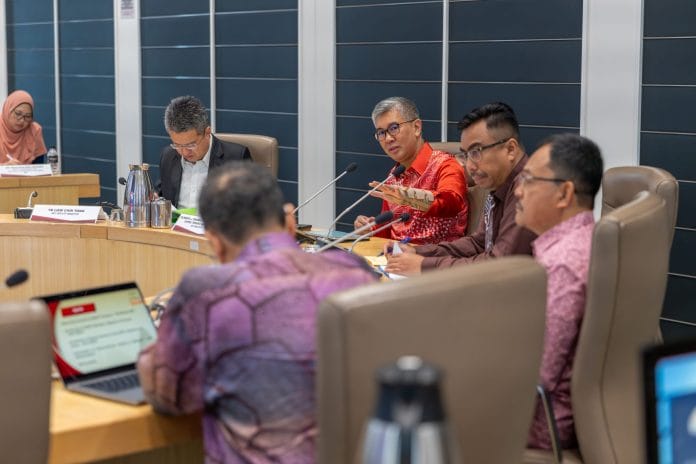The recently-formed National Semiconductor Strategic Task Force (NSSTF), which is tasked to transform Malaysia’s electrical and electronics (E&E) industry, will be focusing and driving improvements to three aspects namely incentives, talent and ecosystem.
In a statement, Ministry of Investment, Trade and Industry (Miti) said the task force established on Jan 9, is a platform to discuss and implement the direction of the country’s semiconductor industry ecosystem.
“This include the efforts to attract strategic and quality investment into the sector,” the ministry said today (Feb 16).
Speaking at the taskforce’s first meeting today, Miti Minister Tengku Datuk Seri Zafrul Abdul Aziz said the the development of E&E industry should be organised more strategically and systematically to create a more conducive ecosystem to attract investments and promotes economic growth.
“This is important because semiconductors are the basic material for various high-tech sectors including electric vehicle (EV) and artificial intelligence (AI)-based sectors – to realize the objectives of the New Industrial Master Plan (NIMP) 2030.
“Thus, among the things that will be prioritized by MITI and NSSTF including the study and renewal of incentive policies, to ensure that Malaysia remains competitive in attracting foreign direct investment (FDI) and domestic (DDI) to generate growth in the E&E sector,” said Zafrul, who also chaired the meeting.
Among the matters that will be prioritized by Miti and the task force includes revising and renewing incentive policies to ensure the country’s competitiveness in attracting foreign direct investments (FDIs) and domestic direct investments (DDI) to promote the sector’s growth.
Besides that, the minister said the task force will also be prioritising talent development to meet the dynamic demand of the industry to solidify the country’s position as the centre of innovation and excellence.
“It will also identify appropriate sectors to form the foundation of sustainable growth, including through local vendor development programme to open the opportunities to local companies and SMEs,” he added.
The first task force meeting also formally introduced 10 industry experts who makes up NSSTF’s Special Advisory Panel from different background and supply chain from local semiconductor industry.
The experts will play a role in insights and feedbacks to the NSSTF on strategies and policies to enable Malaysia to continue to grow and improve its position in the global semiconductor industry.
According to the ministry, semiconductor is the main producer in the country’s E&E industry, contributing to around 40% to Malaysia’s total exports in 2023.
Malaysia’s semiconductor industry also made up 7% of global market and contributed to 13% to the back-end manufacturing activities in the global semiconductor industry.
In order to ensure a holistic approach, the ministry said NSSTF’s membership will consists of representatives from several ministries, government departments, higher education institutions, trade associations, with many of its members, who are industry players who have businesses at a global level.
Meanwhile, the ministry added Collaborative Research in Engineering, Science and Technology (CREST) will be the taskforce’s secretariat to assist in coordinating knowledge sharing and strategic planning.
CREST chief executive officer Jaffri Ibrahim said the agency is committed to support NSSTF in advancing the Malaysian semiconductor industry ecosystem.
“Together with ministry and other stakeholders, we are confident that the taskforce will be able to drive the growth of Malaysian semiconductor industry,” he added.









